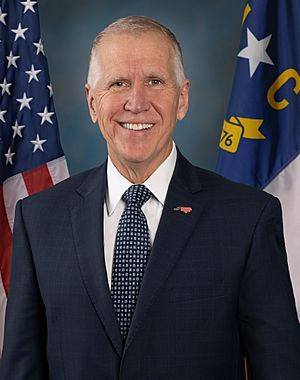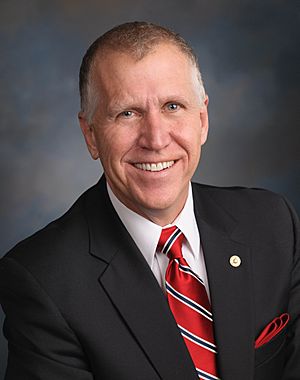Thom Tillis facts for kids
Quick facts for kids
Thom Tillis
|
|
|---|---|

Official portrait, 2022
|
|
| United States Senator from North Carolina |
|
| Assumed office January 3, 2015 Serving with Ted Budd
|
|
| Preceded by | Kay Hagan |
| Speaker of the North Carolina House of Representatives | |
| In office January 26, 2011 – January 3, 2015 |
|
| Preceded by | Joe Hackney |
| Succeeded by | Tim Moore |
| Member of the North Carolina House of Representatives from the 98th district |
|
| In office January 1, 2007 – January 1, 2015 |
|
| Preceded by | John Rhodes |
| Succeeded by | John Bradford |
| Personal details | |
| Born |
Thomas Roland Tillis
August 30, 1960 Jacksonville, Florida, U.S. |
| Political party | Republican |
| Spouse |
Susan Tillis
(m. 1987) |
| Children | 2 |
| Relatives | Rick Tillis (brother) |
| Education | Chattanooga State Community College University of Maryland, University College (BS) |
| Website | |
Thomas Roland Tillis (born August 30, 1960) is an American politician and businessman. He is a member of the Republican Party. Since 2015, he has served as a United States senator for the state of North Carolina.
Before becoming a U.S. senator, Tillis was a member of the North Carolina House of Representatives from 2007 to 2015. He was also the speaker of the State House from 2011 to 2015. This is one of the most powerful jobs in state government.
Tillis is known as a moderate Republican, which means he sometimes works with the Democratic Party on laws. For example, he supported the Respect for Marriage Act, which protects the right to same-sex and interracial marriage in the United States.
On June 29, 2025, Tillis announced he would not run for a third term in the Senate in 2026.
Contents
Early Life and Education
Thom Tillis was born in Jacksonville, Florida. He was the oldest of four boys in a family with six children. His family moved around a lot when he was young. By the time he was 17, he had lived in 20 different places, including New Orleans and Nashville.
After graduating from high school in 1978, Tillis went to work. He later attended Chattanooga State Community College. In 1986, he earned a Bachelor of Science degree from the University of Maryland University College.
Business and Early Political Career
After high school, Tillis worked for an insurance company, helping them use computers for their records. He later worked for the technology company Wang Laboratories. In 1990, he joined the major accounting firm Price Waterhouse, where he became a partner in 1996.
In 2002, Tillis began his political career in the town of Cornelius. He helped get a local bike trail built and was elected to the town's park board. In 2003, he was elected as a town commissioner.
North Carolina House of Representatives
After serving as a town commissioner, Tillis ran for the North Carolina state legislature in 2006 and won. He was reelected three more times. In 2011, his fellow Republicans chose him to be the Speaker of the House. This made him one of the most important leaders in the state.
As speaker, Tillis oversaw major changes. The legislature changed the state's tax system and created new voting laws. One law required voters to show a photo ID. A court later struck down this law, saying it made it harder for African Americans to vote.
U.S. Senate Career
Elections
2014 Election
In 2014, Tillis ran for the U.S. Senate. He faced the current senator, Democrat Kay Hagan. The race was very close. Tillis won with 48.8% of the vote, while Hagan received 47.3%. This was the smallest winning percentage for a U.S. Senate candidate in North Carolina's history.
2020 Election
Tillis ran for reelection in 2020 against Democrat Cal Cunningham. For most of the year, polls showed Cunningham was ahead. However, the race became very close by election day. Tillis won again, getting 48.7% of the vote to Cunningham's 46.9%.
Time in the Senate
As a senator, Tillis has often been seen as a moderate. He has worked with Democrats on some issues but has also supported many of President Donald Trump's policies. He has voted with Trump's positions about 90% of the time.
In 2016, Tillis said that a vacant seat on the Supreme Court should not be filled until after the presidential election. However, in 2020, he supported President Trump's choice for the Supreme Court just two months before the election.
During the COVID-19 pandemic, Tillis tested positive for the virus in October 2020. He generally supported how North Carolina's governor handled the pandemic. He also encouraged people to get vaccinated.
In 2023, the North Carolina Republican Party formally disapproved of some of his actions. They disagreed with his views on immigration and same-sex marriage.
Political Positions
A politician's positions are their views on important issues. These views guide how they vote on laws.
Economic Policy
Tillis has said he believes the government should not set a minimum wage. He thinks this can make things more expensive and lead to fewer jobs. In 2011, he made a comment about people who receive government help that caused some controversy. He later said he regretted his choice of words.
Environment and Climate Change
In 2014, Tillis said he did not believe climate change was happening. By 2018, his view had changed. He said he believes the climate is changing and that humans might be part of the cause. He supported the U.S. leaving the Paris Agreement, an international plan to fight climate change. He has a 9% lifetime score from the League of Conservation Voters, an environmental group.
Gun Policy
Tillis has a strong record of supporting gun rights. He has an "A+" rating from the NRA, a group that supports gun ownership. In 2022, he was one of 15 Republican senators who voted for the Bipartisan Safer Communities Act. This law provided money for states to create red flag laws and strengthened background checks for gun buyers under 21.
Health Care
Tillis is against the Affordable Care Act (ACA), also known as Obamacare. He has voted many times to repeal it. While in the North Carolina legislature, he led the effort to stop the state from expanding Medicaid, a government health care program for low-income people.
Immigration
Tillis has worked on laws related to immigration. In 2017, he proposed a bill to help some young people who were brought to the U.S. as children without official permission. His bill would have given them a way to earn legal residency and eventually citizenship.
In 2019, he first opposed President Trump's plan to declare a national emergency to fund a wall on the border with Mexico. However, he later changed his mind and voted to support it.
LGBT Rights
In 2012, Tillis helped pass a law in North Carolina that banned same-sex marriage. However, his views have changed over time. In 2022, he voted for the Respect for Marriage Act. This federal law protects the right to same-sex and interracial marriages across the country. He called the bill "a good compromise."
Personal Life
Tillis and his wife, Susan, live in Huntersville, North Carolina. They have two children. His brother, Rick, also served in politics as a state representative in Tennessee.
In March 2021, Tillis announced that he had prostate cancer. He said it was found early during a regular check-up and encouraged other men to get regular health screenings.
See also
 In Spanish: Thom Tillis para niños
In Spanish: Thom Tillis para niños
 | Victor J. Glover |
 | Yvonne Cagle |
 | Jeanette Epps |
 | Bernard A. Harris Jr. |


